Karen Pittman Is Ready to Bring the Chaos in ‘The Morning Show’
After three seasons as the undersung glue of Apple TV’s drama, the actress behind Mia wants to “wreak some havoc.”
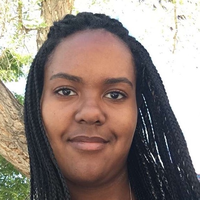
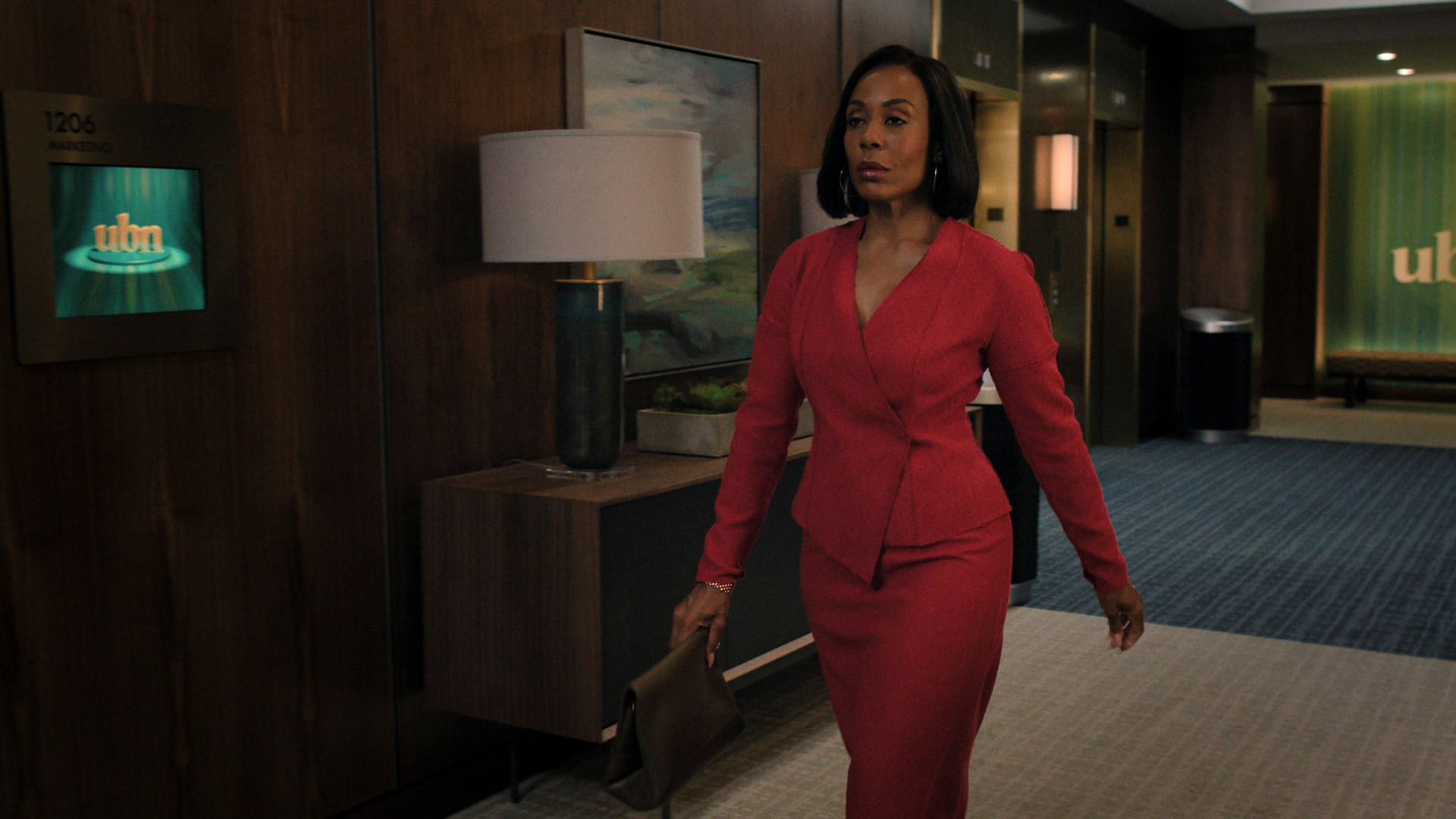
Select the newsletters you’d like to receive. Then, add your email to sign up.
You are now subscribed
Your newsletter sign-up was successful
Want to add more newsletters?

Delivered daily
Marie Claire Daily
Get exclusive access to fashion and beauty trends, hot-off-the-press celebrity news, and more.

Sent weekly on Saturday
Marie Claire Self Checkout
Exclusive access to expert shopping and styling advice from Nikki Ogunnaike, Marie Claire's editor-in-chief.

Once a week
Maire Claire Face Forward
Insider tips and recommendations for skin, hair, makeup, nails and more from Hannah Baxter, Marie Claire's beauty director.

Once a week
Livingetc
Your shortcut to the now and the next in contemporary home decoration, from designing a fashion-forward kitchen to decoding color schemes, and the latest interiors trends.

Delivered Daily
Homes & Gardens
The ultimate interior design resource from the world's leading experts - discover inspiring decorating ideas, color scheming know-how, garden inspiration and shopping expertise.
This story contains extensive spoilers for The Morning Show season 4, episode 5, “Amari.” For the first three seasons of The Morning Show, Karen Pittman’s Mia Jordan is the glue that holds the fictional talk show TMS together. Even when the Apple TV series starring Jennifer Aniston and Reese Witherspoon veers into wild territory—including a space launch over a year before Gayle King’s—Mia weathers it all without getting the recognition or Head of News promotion she deserves. That is, until season 4, when she decides to quit TMS’s thankless game and play by her own rules.
“It's like when you finally break it off with that toxic boyfriend that you've been in a relationship with for years and years and years,” Pittman tells Marie Claire over Zoom. “You're like, look, this is not off and on, off and on. This is off and it's off, period.”
However, like a toxic ex, UBN just can’t let Mia get away. In season 4’s fifth episode, “Amari,” streaming October 15, the producer is pulled back into TMS’s orbit when Alex Levy (Aniston) blocks her from landing a job at a competitor. But rather than going back to her executive producer role, Mia finds an unlikely ally in Chris (Nicole Beharie), and comes to the former Olympian's support as she faces doping accusations. By the end of the episode, Mia has a rebellious confidence, a badass makeover (lob included), and new leverage after delivering a cathartic, “Fuck you,” to Alex.
“There is a different standard held for women in general, but certainly Black women,” Pittman says. “Alex can fuck her billionaire boyfriend, and Corey can leak a racist email, but I can't play this game too." Mia has faced a double-standard felt by many women of color in the corporate world, that has made her feel that she can't step a toe out of line and take the wild swings that TMS's executives have been getting away with for years. But now Mia's free to play dirty, Pittman teases, "and y'all are going to have to deal with it."
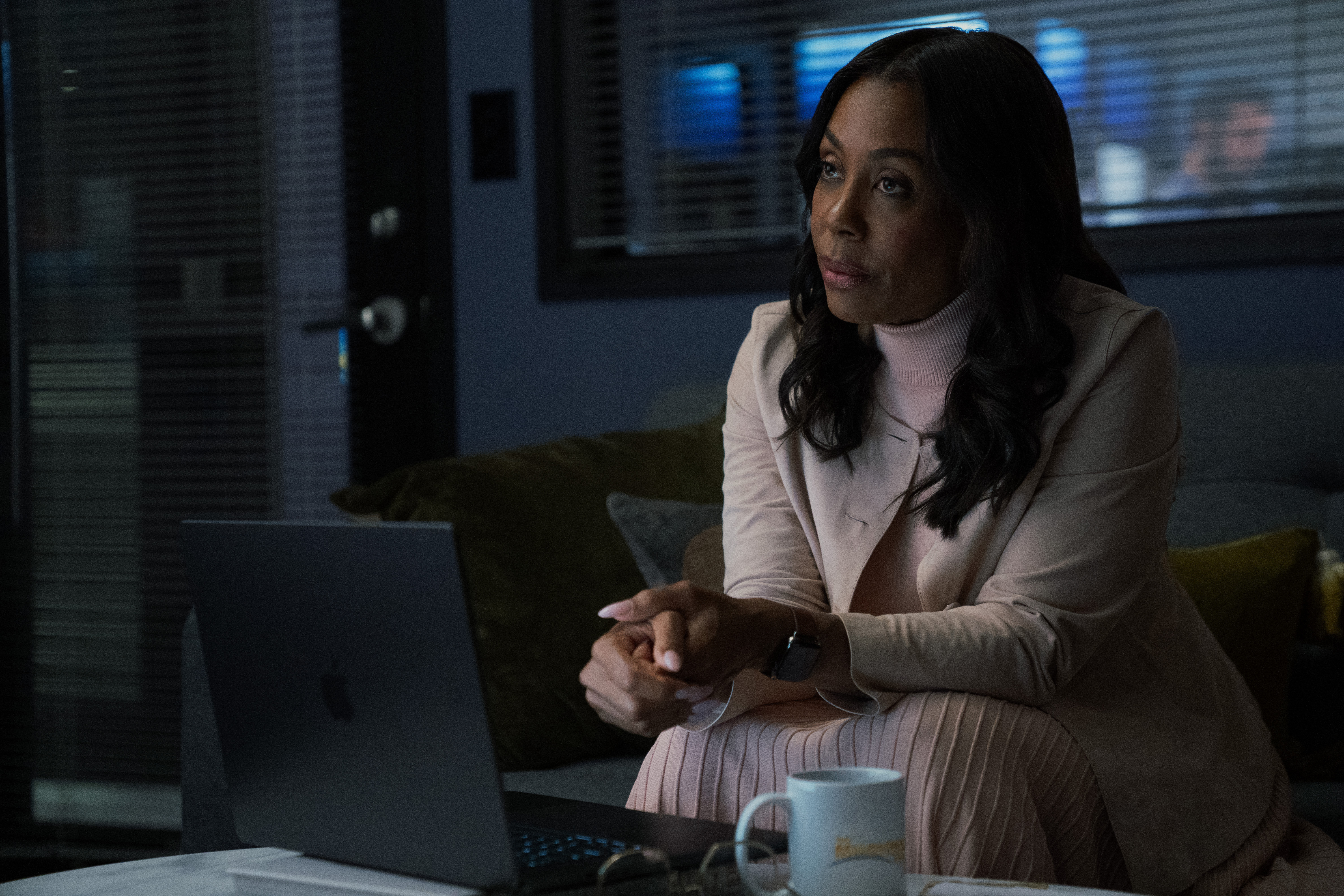
Mia Jordan (Karen Pittman) on her last day as executive producer, in episode 3.
While Mia figures out her next steps, Pittman is reaching new heights in her career; last year she received her first Emmy nomination for The Morning Show’s third season, and this May brought her acclaimed turn as doting mom Dawn Edwards in the Netflix romance Forever. (Next up, both Forever season 2—which she only teases as “really good”—and Morning Show season 5.) The actress is aware that the tenacity she’s shown in her career translates to the kinds of roles she chooses—whether it’s Mia, Dawn, or Dr. Nya Wallace on …And Just Like That.
“I've made myself in the image of a woman who had great ambition, but was also able to do a lot of things well,” she says, referring to her mother. “That is the kind of character that I can create because I have a strong image of that in my mind, but I also can expand on that image in a lot of ways to bring emotion, feeling, heart, and all the other characteristics that these characters need in order to make them human, in order for you to believe in them, and be like, I know her. That's my aunt, or, I want to be like that, or, I don't want to be like that at all.”
Below, Pittman chats with Marie Claire about bringing strong female characters to life, filming those dramatic scenes with Beharie and Aniston, and where Mia goes from here.
Get exclusive access to fashion and beauty trends, hot-off-the-press celebrity news, and more.
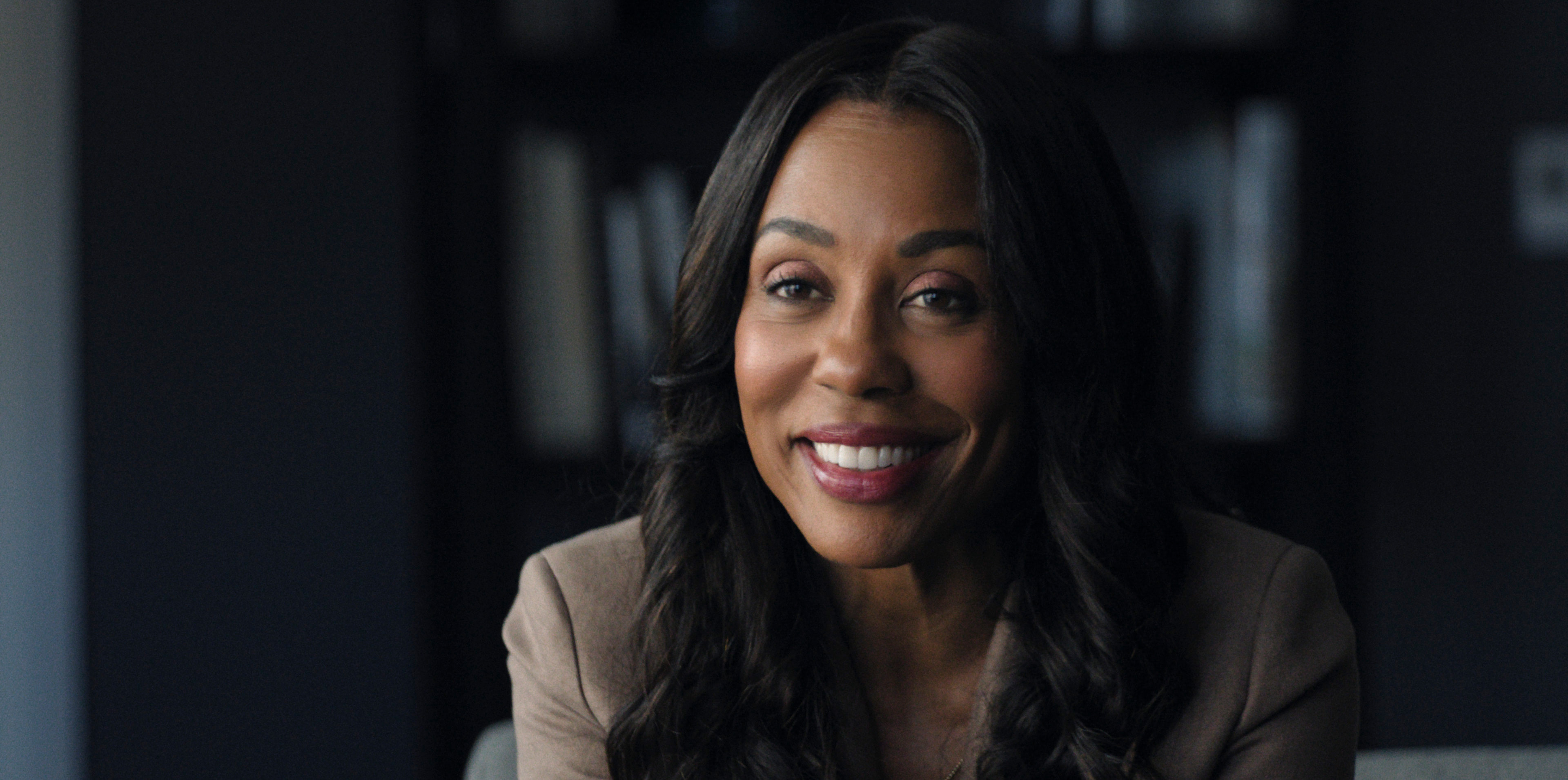
Mia, excited about the future post-TMS, in episode 5.
Marie Claire: Your most well-known roles include a lot of determined career women. Do you actively look for these types of characters?
Karen Pittman: I have auditioned for roles with women who are in much worse circumstances—moms who are living in urban environments, struggling. I don't get those parts. I think part of it is because that isn't naturally what I exude, but I also think that I have a real take on who this woman is right now in our world, in the 21st century—what it looks like to be a woman of color with kids, with a job, who has ambition. I had a strong maternal figure in my mother, who was very smart and ambitious, [the] first in her family to go to college. I went to grad school [at NYU for acting] with an infant son—that's kind of the lore around me. But my mother studied at Fisk University with five children at home and got her master's degree in biology. [It's like], where did you find the grit and the determination and the fortitude to do it?
That's definitely part of the journey that I had with Mia Jordan this season. Where does she find it? Where does that come into her? How does she do it? In our culture, we refer to it as ‘Black girl magic,’ but sometimes I'm like, I don't think it's a magical trait. I think it's what we have to do in order to thrive. Certainly, in my own life, there were periods where it was like, You have two kids, you're a single mother. Girl, you need to stop acting. You need to go get a “real job.” But in order for me to raise my children and to thrive, I really had to do several things at once, and I had to be twice as good as everyone around me, and that was just the way I lived my life.
That's part of what Mia has done over the last three and a half seasons that we see her. She's been twice as good. She's been a company woman. She's held TMS together through the pandemic, through a merger, through the #MeToo crisis in season 1. And now, when it's time for her to rise to the top, suddenly the glass ceiling is there and she's hitting up against it. So episode 5, she comes back in and sashays her way into a new place.
MC: I loved seeing Mia with her bestie, Zaria (Nichelle Hines), especially when they’re dancing in the hall after the job interview. It’s so nice being able to see Mia outside of TMS and see how much life and joy she has.
KP: And the love that she has in her life. We go back to episode 2, where Chris is like, “I have relationships that matter to me. You don’t have anybody except for this job,” and that was hurtful. But it was important for us to see that Mia does have a life. She does have people who love her. Mia goes to this network that’s supposed to be kind of an OWN, and her friend works there. Nichelle Hines is a fantastic actress, and we had a really great time filming that. That was fun to see Mia in a different element at a different company. When [showrunner Charlotte Stoudt] said, “What do you think about Mia going over here and doing this?” I was like, “Yeah. Let's see what her energy is in someplace completely different from UBN. How cool would that be?”
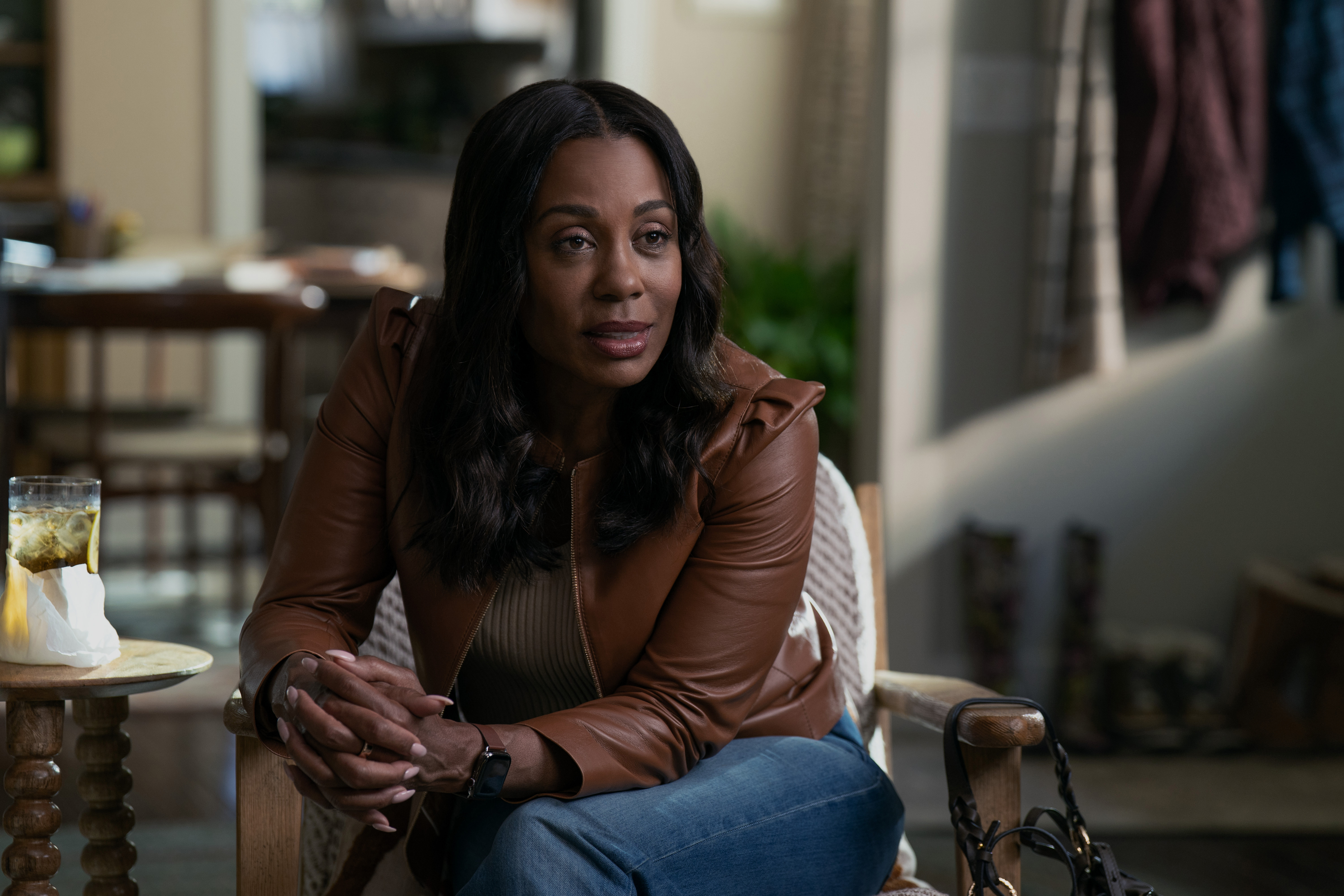
Pittman says of Mia, "She's held TMS together through the pandemic, through a merger, through the #MeToo crisis in season 1. And now, when it's time for her to rise to the top, suddenly the glass ceiling is there and she's hitting up against it."
MC: Mia and Chris finally join forces in this episode. What was it like to film that dynamic with Nicole Beharie?
KP: Nicole has this incredible process as an actor, so you really just want to be there to support her in her journey, and she's an awesome support as well. That [confession] scene was brutal as far as how the truth comes out about what was going on with Chris at the time, but also what a gift it was for Mia to support her. I don't think she thought even remotely that the outcome would be what ends up happening. [The] episode was directed by Millicent Shelton. She has a real finger on the pulse of what really good storytelling for people of color looks like, so it was a real gift to have her directing it.
MC: In season 3, Mia alludes to TMS being a plantation, and now, in blocking Mia’s new job, Alex demonstrates a kind of ownership of her. Tell me about filming that confrontation at the end of this episode.
KP: What Alex ends up doing is using her privilege to undermine Mia's ability to move on. She doesn't see it as that. She sees it as, Oh no, we want you here. You're part of us. And Mia's like, That's my choice. You don't get to decide that. Why do you get to decide it? That is a function of power and privilege that Alex doesn't understand that she can't make that choice for her. It’s a very well-written scene, so tricky, but Jen Aniston was game. She came busting through the door game and ready for it, which was fun.
It was very easy to keep Mia cool. It’s very important to me that she did not look like she was out for revenge, but that she had a clarity. You know what it's like as a woman of color when you were like, Oh, I'm Black. Suddenly you're like, Oh shit. This is where this Black thing comes in and keeps me back. This is what discrimination is all about, and it's a rude awakening when you discover that that’s the only reason why they can allow you not to move up. Not because you’re uneducated, not because you haven't spent years in the game, not because you haven't sacrificed and held the thing together and kept everybody moving forward. The only reason why they're holding you back is because of your skin color. For Mia [in that scene], it's like, Oh no, I'm clear. I'm clear about what this place is. I'm clear about who you are. I'm clear about what I'm doing, this is what I'm going to do, and you're not going to stop me. I’ll see you in the ring. That's a different person from now on—not because I've changed, but now I see who you are.
I have a hard time watching myself on these shows, but this is one of those scenes where I did. [In the final moments] I could feel that nervousness in Mia when she was like, “I think [Chris and I] make a great team.” It's sort of an out-of-body experience for me when I’m acting; I try to stay deep in the world of the character. But in this confrontation, I wanted to really be in it, and I could feel [Alex’s] energy and wanting to tell her, “This is done. I'm not going to back down. I'm going to stick by Chris and we're going to figure this out, and fuck you.” So when Mia walks out, it isn't a big “I'm done!” It's really calm, like, “No, no, no, this is it.”
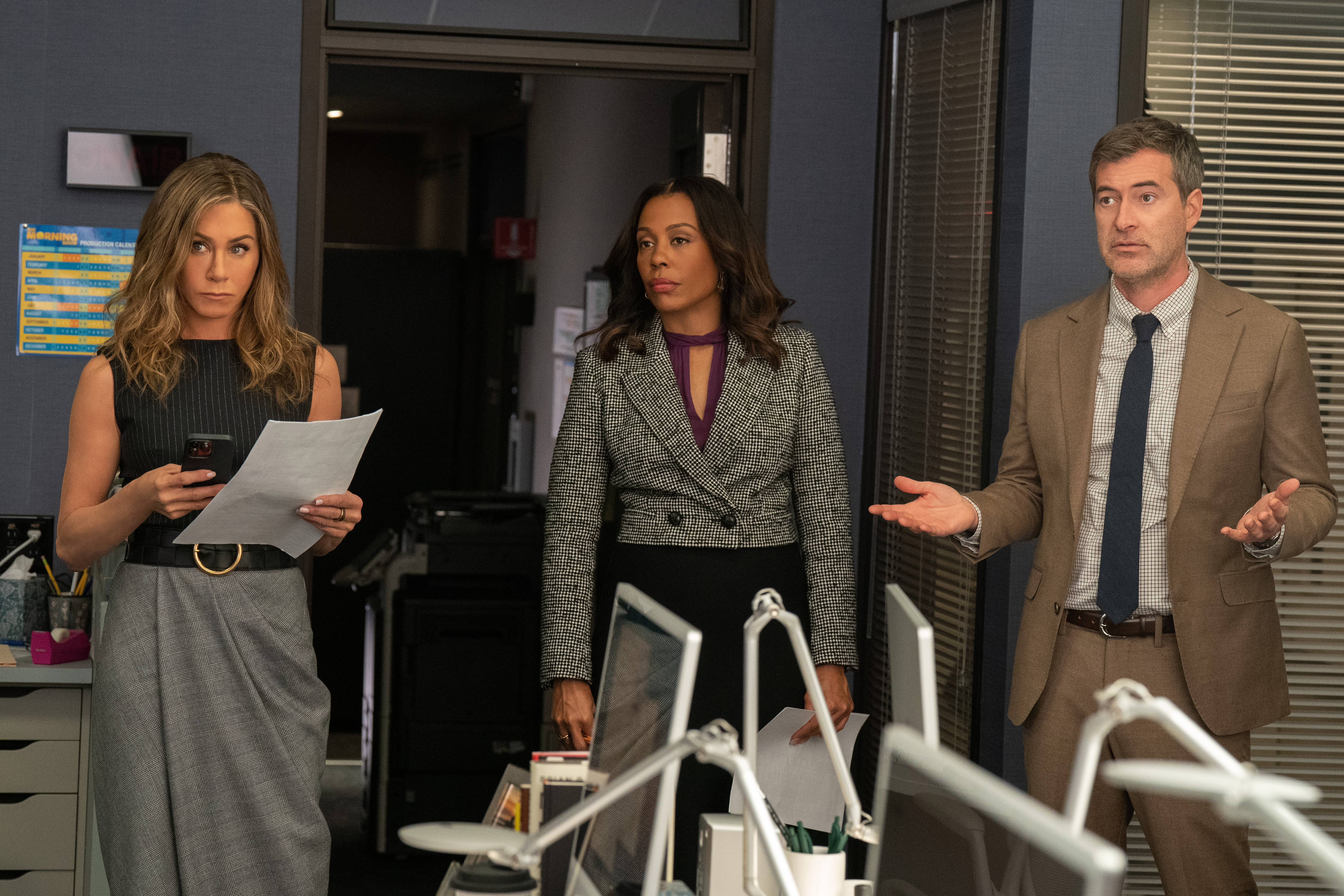
From left: Alex Levy (Jennifer Aniston), Mia Jordan, and Chip Black (Mark Duplass) in The Morning Show.
MC: Now that Mia has more leverage after Chris’s confession, the question is whether they’ll go somewhere else or improve their situation at TMS. Can you tease what’s to come?
KP: I think part of the answer to that question is in what [her ex] André (Clive Standen) says to her across the pool table. He referred to covering Ukraine; the Ukrainian folks who couldn't take over and get rid of the Russian troops entirely, while he was there, but they did do some damage. I think that’s what Mia is intending to do in her own way: to do some damage as a sort of vigilante and, in the meantime, protect the people that she can.
She explores that as best she can over the next five episodes, but she does wreak some havoc. You'll see as we go through to episode 10 that there is damage to be done, because it’s inherent to the hierarchy in that company. There's always somebody who's got beef, who wants to go in there and do some damage as well. They have a bone to pick, and if you can help them do it, they'll do it with you. So, I think she will end up doing damage at UBN, but only in the way that Mia can do it. She knows where all of the bodies are buried, she has a lot of the secrets in her back pocket, and she'll have more before the end of the season.
I think she certainly can either leave her job at UBN, or do it in the way that she wants to do it if she does go back. But we'll see.
This interview has been edited and condensed for clarity.
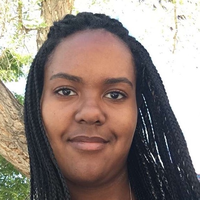
Quinci LeGardye is a Culture Writer at Marie Claire. She currently lives in her hometown of Los Angeles after periods living in NYC and Albuquerque, where she earned a Bachelor’s degree in English and Psychology from The University of New Mexico. In 2021, she joined Marie Claire as a contributor, becoming a full-time writer for the brand in 2024. She contributes day-to-day-content covering television, movies, books, and pop culture in general. She has also written features, profiles, recaps, personal essays, and cultural criticism for outlets including Harper’s Bazaar, Elle, HuffPost, Teen Vogue, Vulture, The A.V. Club, Catapult, and others. When she isn't writing or checking Twitter way too often, you can find her watching the latest K-drama, or giving a concert performance in her car.